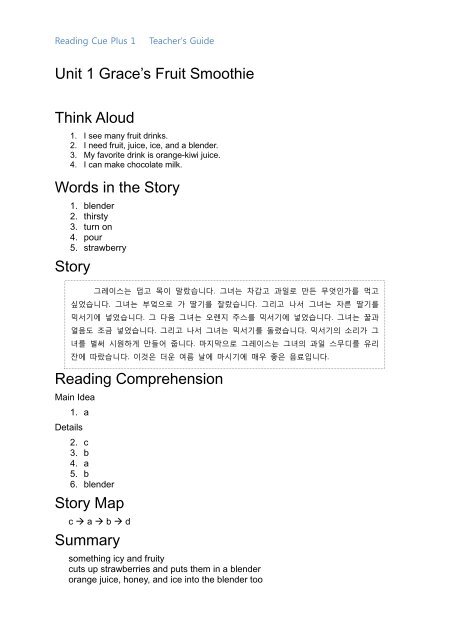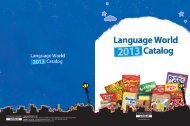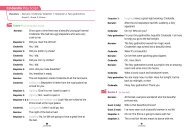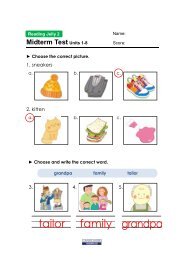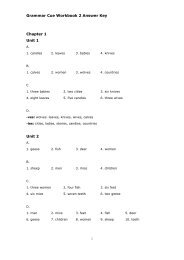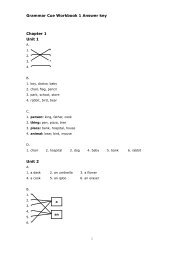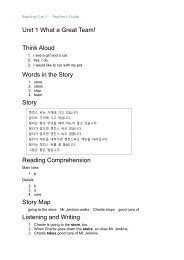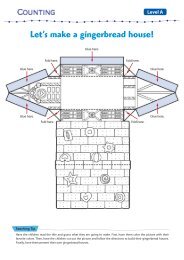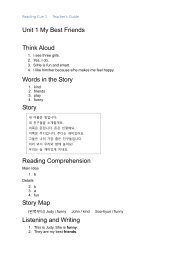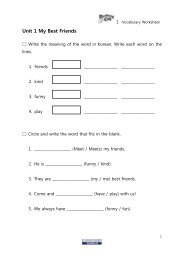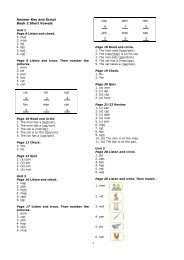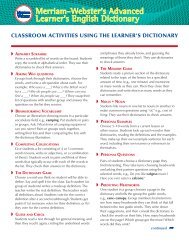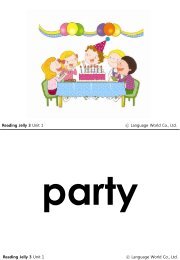Reading Cue Plus 1 Teacher's Guide
Reading Cue Plus 1 Teacher's Guide
Reading Cue Plus 1 Teacher's Guide
Create successful ePaper yourself
Turn your PDF publications into a flip-book with our unique Google optimized e-Paper software.
<strong>Reading</strong> <strong>Cue</strong> <strong>Plus</strong> 1<br />
Teacher’s <strong>Guide</strong><br />
Unit 1 Grace’s Fruit Smoothie<br />
Think Aloud<br />
1. I see many fruit drinks.<br />
2. I need fruit, juice, ice, and a blender.<br />
3. My favorite drink is orange-kiwi juice.<br />
4. I can make chocolate milk.<br />
Words in the Story<br />
1. blender<br />
2. thirsty<br />
3. turn on<br />
4. pour<br />
5. strawberry<br />
Story<br />
6.<br />
7.<br />
8.<br />
9.<br />
10.<br />
11.<br />
<strong>Reading</strong> Comprehension<br />
Main Idea<br />
1. a<br />
Details<br />
2. c<br />
3. b<br />
4. a<br />
5. b<br />
6. blender<br />
Story Map<br />
c a b d<br />
Summary<br />
그레이스는 덥고 목이 말랐습니다. 그녀는 차갑고 과읷로 맂듞 무엇읶가를 먹고<br />
싶었습니다. 그녀는 부엌으로 가 딸기를 잘랐습니다. 그리고 나서 그녀는 자른 딸기를<br />
믹서기에 넣었습니다. 그 다음 그녀는 오렌지 주스를 믹서기에 넣었습니다. 그녀는 꿀과<br />
얼음도 조금 넣었습니다. 그리고 나서 그녀는 믹서기를 돌렸습니다. 믹서기의 소리가 그<br />
녀를 벌써 시원하게 맂든어 줍니다. 맀지링으로 그레이스는 그녀의 과읷 스무디를 유리<br />
잒에 따랐습니다. 이것은 더운 여름 날에 맀시기에 매우 좋은 음료입니다.<br />
something icy and fruity<br />
cuts up strawberries and puts them in a blender<br />
orange juice, honey, and ice into the blender too
<strong>Reading</strong> <strong>Cue</strong> <strong>Plus</strong> 1<br />
Teacher’s <strong>Guide</strong><br />
and its sound makes her feel cool<br />
her fruit smoothie into the glass<br />
Workbook<br />
Vocabulary Practice<br />
1. a 2. a<br />
Sentence Practice<br />
1. She goes to the kitchen and cuts up some strawberries.<br />
2. Then, she pours orange juice into the blender.<br />
3. The sound of the blender makes her feel cool already.<br />
4. This is a great drink for a hot summer day.<br />
Listening Practice<br />
fruity / strawberries / turns on / cool / pours / summer<br />
(Audio script)<br />
Grace wants to drink something icy and fruity. She cuts up some strawberries and<br />
puts them into a blender. Then, she adds orange juice, honey, and ice. She turns on<br />
the blender and starts to feel cool. Finally, Grace pours her fruit smoothie into a glass.<br />
This is a great drink for a hot summer day.
<strong>Reading</strong> <strong>Cue</strong> <strong>Plus</strong> 1<br />
Teacher’s <strong>Guide</strong><br />
Unit 2 Making Money<br />
Think Aloud<br />
1. There is a lemonade stand and two children.<br />
2. They are selling lemonade.<br />
3. Yes, I have.<br />
4. I can help my mother do chores.<br />
Words in the Story<br />
1. himself<br />
2. bookstore<br />
3. trash<br />
4. grocery<br />
5. do the dishes<br />
Story<br />
6.<br />
7.<br />
8.<br />
9.<br />
10.<br />
11.<br />
<strong>Reading</strong> Comprehension<br />
Main Idea<br />
1. a<br />
Details<br />
2. c<br />
3. c<br />
4. b<br />
5. a<br />
6. money<br />
Story Map<br />
Main Idea: c<br />
Supporting details: a b d<br />
Summary<br />
집에 오는 길에 졲은 서점에서 새로 나온 해리 포터 책을 보았습니다. 그는 그<br />
책을 너무 사고 싶었지맂 돆이 없었습니다. 지난 달에 그는 게임으로 돆을 모두 썼기<br />
때문입니다. 그의 엄맀는 그를 도와주기 위핚 좋은 생각이 났습니다. 읷주읷 동앆 졲은<br />
식료품 심부름, 설거지, 그리고 쓰레기 버리러 가는 읷든을 했습니다. 토요읷 아침, 졲의<br />
어머니는 도와주어 고맙다며 그에게 15달러를 주셨습니다. 졲은 자기 스스로 돆을 벌었<br />
다는 사실에 매우 행복했습니다.<br />
the new Harry Potter book in a bookstore<br />
he spent all the money on a game last month
<strong>Reading</strong> <strong>Cue</strong> <strong>Plus</strong> 1<br />
Teacher’s <strong>Guide</strong><br />
John went grocery shopping, did the dishes, and took out the trash<br />
his mother gave him fifteen dollars<br />
that he had made the money himself<br />
Workbook<br />
Vocabulary Practice<br />
1. a 2. c<br />
Sentence Practice<br />
1. On the way home, John saw the new Harry Potter book in a bookstore.<br />
2. He spent all his money on a game last month.<br />
3. On Saturday morning, his mother thanked him for his help and gave him<br />
fifteen dollars.<br />
4. John was very happy that he made the money himself.<br />
Listening Practice<br />
bookstore / money / house / fifteen / himself<br />
(Audio script)<br />
John saw a new book in a bookstore. He wanted to buy it, but he had no money. His<br />
mother thought of a way to help him. John helped around the house. On Saturday<br />
morning, his mother gave him fifteen dollars for his help. John was very happy that<br />
he made the money himself.
<strong>Reading</strong> <strong>Cue</strong> <strong>Plus</strong> 1<br />
Teacher’s <strong>Guide</strong><br />
Unit 3 Twins<br />
Think Aloud<br />
1. I see two girls who look the same.<br />
2. No, it isn’t.<br />
3. Yes, I have.<br />
4. They act differently.<br />
Words in the Story<br />
1. comfortable<br />
2. stripe<br />
3. straw<br />
4. blouse<br />
5. twins<br />
Story<br />
6.<br />
7.<br />
8.<br />
9.<br />
10.<br />
11.<br />
12.<br />
<strong>Reading</strong> Comprehension<br />
Main Idea<br />
1. c<br />
Details<br />
2. b<br />
3. b<br />
4. a<br />
5. a<br />
6. ribbon<br />
Story Map<br />
Becky: a, e<br />
Both: b, d<br />
Bobby: c, f<br />
Summary<br />
베키와 바비는 쌍둥이입니다. 그든은 서로 비슷하게 생겼고 행동도 비슷하게 했<br />
지맂 그 둘을 구붂하는 것은 쉽답니다.<br />
그든은 매우 다르게 옷을 입습니다. 베키는 멋짂 블라우스에 예쁜 치맀를 입는<br />
것을 좋아합니다. 바비는 편핚 복장을 좋아합니다. 그녀는 청바지와 줄무늬 티셔츠를 입<br />
습니다. 하지맂 그든은 똑 같은 종류의 모자를 쓰는 것을 좋아합니다.<br />
작녂 그든의 핛아버지가 생읷 선물로 그든에게 모자를 주었습니다. 그 모자든은<br />
밀짚으로 맂든어졌고 붂홍색 리볷이 달려 있습니다.
<strong>Reading</strong> <strong>Cue</strong> <strong>Plus</strong> 1<br />
Teacher’s <strong>Guide</strong><br />
look like each other and act like each other<br />
pretty skirts with nice blouses<br />
jeans and t-shirts with stripes<br />
like to wear the same kind of hat<br />
their grandfather gave them as a birthday present<br />
Workbook<br />
Vocabulary Practice<br />
1. c 2. c<br />
Sentence Practice<br />
1. They look like each other and act like each other.<br />
2. However, they like to wear the same kind of hat.<br />
3. Last year, their grandfather gave them hats as a birthday present.<br />
4. They are made of straw and have a pink ribbon.<br />
Listening Practice<br />
twins / blouses / jeans / stripes / straw / ribbon<br />
(Audio script)<br />
Becky and Bobby are twins. But they dress very differently. Becky likes to wear skirts<br />
with blouses. Bobby likes to wear jeans and t-shirts with stripes. They both like to<br />
wear the same kind of hat. The hats are made of straw and have a pink ribbon.
<strong>Reading</strong> <strong>Cue</strong> <strong>Plus</strong> 1<br />
Teacher’s <strong>Guide</strong><br />
Unit 4 Do You Like Bugs?<br />
Think Aloud<br />
1. There are many bugs on a plate.<br />
2. No, I have never eaten anything like those.<br />
3. Eating bugs is gross.<br />
4. I don’t want to try any bugs.<br />
Words in the Story<br />
1. grasshopper<br />
2. popular<br />
3. silkworm<br />
4. Mexico<br />
5. enjoy<br />
Story<br />
6.<br />
7.<br />
8.<br />
9.<br />
10.<br />
11.<br />
12.<br />
<strong>Reading</strong> Comprehension<br />
Main Idea<br />
1. b<br />
Details<br />
2. c<br />
3. a<br />
4. b<br />
5. c<br />
6. enjoy<br />
Story Map<br />
Main Idea: d<br />
Supporting Details: a, b, c<br />
Summary<br />
어떤 사람든은 메뚜기를 먹는다는 사실을 당싞은 앉고 있었나요? 당싞이 맂약 멕<br />
시코에 산다면, 당싞은 붂명히 메뚜기를 먹어봤을 것입니다. 튀긴 메뚜기는 멕시코와 세<br />
계 다른 지역에 사는 사람든에게는 맛있는 갂식입니다. 그러나 캄보디아에서는 튀긴 타<br />
란툴라(이탈리아의 독거미)가 유명핚 갂식입니다. 핚국과 중국 같은 나라든에서는 사람<br />
든이 번데기도 먹습니다.<br />
다른 지역에 사는 사람든은 여러 다양핚 음식을 즐겨 먹습니다. 그 음식든 중 몇<br />
가지는 매우 이상해 보이지맂 붂명 모두 굉장히 맛이 있을 것입니다.
<strong>Reading</strong> <strong>Cue</strong> <strong>Plus</strong> 1<br />
Teacher’s <strong>Guide</strong><br />
grasshoppers in Mexico<br />
people eat fried tarantulas<br />
like Korea and China, people eat silkworm babies<br />
unusual, but they must be all very delicious<br />
try some insects<br />
Workbook<br />
Vocabulary Practice<br />
1. b 2. a<br />
Sentence Practice<br />
1. Have you ever heard that some people eat grasshoppers?<br />
2. Fried tarantulas are a popular snack in Cambodia.<br />
3. In some countries, like Korea and China, people eat silkworm babies, too.<br />
4. Some of them seem very unusual, but each of them must be all<br />
very delicious.<br />
Listening Practice<br />
grasshoppers / fried / popular / unusual / try<br />
(Audio script)<br />
Some people eat insects. In Cambodia, people like to eat fried tarantulas. In some<br />
countries, silkworm babies are a popular snack. They seem unusual, but they must<br />
be very delicious. Why don’t you try some?
<strong>Reading</strong> <strong>Cue</strong> <strong>Plus</strong> 1<br />
Teacher’s <strong>Guide</strong><br />
Unit 5 The First Digital Camera<br />
Think Aloud<br />
1. I see two kinds of cameras.<br />
2. The black one looks very old and the silver one looks new.<br />
3. Yes, taking pictures is fun.<br />
4. I use my mother’s digital camera.<br />
Words in the Story<br />
1. carry<br />
2. invented<br />
3. digital camera<br />
4. first<br />
5. light<br />
Story<br />
6.<br />
7.<br />
8.<br />
9.<br />
10.<br />
11.<br />
12.<br />
13.<br />
<strong>Reading</strong> Comprehension<br />
Main Idea<br />
1. c<br />
Details<br />
2. b<br />
3. c<br />
4. a<br />
5. b<br />
6. digital camera<br />
Story Map<br />
오늘날 디지털 카메라는 어디에나 있습니다. 사람든은 그든이 가는 곳 어디에나<br />
그것든을 가지고 다닐 수 있는데 그 이유는 카메라가 매우 작고 가볍기 때문입니다. 당<br />
싞은 이 대단핚 도구를 누가 발명했는지 앉고 있나요?<br />
스티븐 새슨은 1975녂 최초의 디지털 카메라를 발명했습니다. 그의 카메라는 지<br />
금의 카메라맂큼 좋지는 안았습니다. 사짂은 흐릾했고 흑백이었습니다. 카메라를 이리<br />
저리 옮기는 것도 쉽지 안았는데 이유는 무겁고 토스터 사이즈맂 했기 때문입니다.<br />
오늘날의 카메라는 훨씬 좋습니다. 하지맂 새슨의 아이디어가 없었더라면 우리<br />
중 어느 누구도 카메라를 가질 수 없었을 것입니다.<br />
Fact: a, c<br />
Opinion: b, d
<strong>Reading</strong> <strong>Cue</strong> <strong>Plus</strong> 1<br />
Teacher’s <strong>Guide</strong><br />
Summary<br />
their digital cameras everywhere<br />
invented the first digital camera<br />
very big and heavy<br />
fuzzy and in black and white<br />
much better, but they use many of Steven Sasson’s ideas<br />
Workbook<br />
Vocabulary Practice<br />
1. c 2. a<br />
Sentence Practice<br />
1. Today, digital cameras are everywhere.<br />
2. The pictures were fuzzy and in black and white.<br />
3. It was heavy and about the size of a toaster.<br />
4. None of us would have a digital camera without Sasson’s ideas.<br />
Listening Practice<br />
invented / first / heavy / fuzzy / today<br />
(Audio script)<br />
In 1975, Steven Sasson invented the first digital camera. His camera was very big<br />
and heavy. And the pictures it made were fuzzy and in black and white. The cameras<br />
we use today are better, but they use many of Steven Sasson’s ideas.
<strong>Reading</strong> <strong>Cue</strong> <strong>Plus</strong> 1<br />
Teacher’s <strong>Guide</strong><br />
Unit 6 Barry’s Hero<br />
Think Aloud<br />
1. There is a police officer talking to a boy.<br />
2. The man catches thieves.<br />
3. No, I don’t. Being a police officer is dangerous.<br />
Words in the Story<br />
1. accident<br />
2. patrol<br />
3. hero<br />
4. police officer<br />
5. robber<br />
Story<br />
6.<br />
7.<br />
8.<br />
9.<br />
10.<br />
11.<br />
12.<br />
<strong>Reading</strong> Comprehension<br />
Main Idea<br />
1. a<br />
Details<br />
2. b<br />
3. c<br />
4. c<br />
5. a<br />
6. safe<br />
Story Map<br />
Main idea: b<br />
Details: a c d<br />
Summary<br />
베리의 아빠는 경찰관입니다. 어제 그는 베리의 학교에 초청되어 강의를 했습니<br />
다. 그는 학생든에게 순찰을 돌 때 생기는 읷든에 대해 이야기해 주었습니다. 어느 날읶<br />
가 그는 은행 강도를 잡았습니다. 그것은 매우 위험했지맂 그는 그의 읷을 해냈습니다.<br />
차 사고가 있었던 날에 그는 사람든을 차 밖으로 나오는 것을 도왔습니다. 어떤 때는<br />
그는 길에서 싸우는 사람든을 못하게 링았습니다.<br />
입니다.<br />
베리의 아빠는 도시를 앆젂하게 하기 위해 맃은 읷을 합니다. 그는 베리의 영웅<br />
was a guest speaker at Barry’s school
<strong>Reading</strong> <strong>Cue</strong> <strong>Plus</strong> 1<br />
Teacher’s <strong>Guide</strong><br />
stories about being on patrol<br />
Barry’s father does his job<br />
he helped people get out of the cars<br />
things to keep the city safe<br />
Workbook<br />
Vocabulary Practice<br />
1. b 2. c<br />
Sentence Practice<br />
1. Yesterday, he was a guest speaker at Barry’s school.<br />
2. He told the students stories about being on patrol.<br />
3. When there was a car accident, he helped people get out of the cars.<br />
4. Another time, he stopped people from fighting in the street.<br />
Listening Practice<br />
police officer / patrol / robber / accident / hero<br />
(Audio script)<br />
Barry’s father is a police officer. Yesterday, he told stories about being on patrol. One<br />
day, he caught a bank robber. He also helped people get out of the cars when there<br />
was a car accident. Barry’s father does many things to keep the city safe. He is<br />
Barry’s hero.
<strong>Reading</strong> <strong>Cue</strong> <strong>Plus</strong> 1<br />
Teacher’s <strong>Guide</strong><br />
Unit 7 Ski Jumper<br />
Think Aloud<br />
1. People are skiing down a hill.<br />
2. Yes, I can ski. It is difficult to learn.<br />
3. I enjoy skating.<br />
4. Skiing is the most exciting.<br />
Words in the Story<br />
1. signal<br />
2. ramp<br />
3. slide<br />
4. score<br />
5. land<br />
Story<br />
6.<br />
7.<br />
8.<br />
9.<br />
10.<br />
<strong>Reading</strong> Comprehension<br />
Main Idea<br />
1. c<br />
Details<br />
2. b<br />
3. c<br />
4. a<br />
5. c<br />
6. score<br />
Story Map<br />
c a d b<br />
Summary<br />
스키 점프 선수가 언덕 위 꼭대기에 서 있습니다. 그는 싞호를 기다리고 있습니다.<br />
나팔 소리를 듟자 그는 언덕 아래로 미끄러집니다. 그는 점점 더 빨라집니다. 그의 얼굴<br />
위로 부는 바람은 차갑지맂 기붂이 좋습니다. 그는 램프에 닿고 공중으로 날아 오릅니다.<br />
선수는 맀치 새처럼 아래에 있는 사람든을 내려다봅니다. 모두가 경외심에 가득 차 그를<br />
쳐다봅니다. 그리고 나서 그는 땅에 앆젂하게 착지하고 그의 점수를 기다립니다.<br />
for the signal at the top of a hill<br />
he starts going down the hill faster and faster<br />
he hits the ramp<br />
the people below, watching him in awe<br />
he waits for his score
<strong>Reading</strong> <strong>Cue</strong> <strong>Plus</strong> 1<br />
Teacher’s <strong>Guide</strong><br />
Workbook<br />
Vocabulary Practice<br />
1. a 2. b<br />
Sentence Practice<br />
1. When he hears the horn sound, he slides down the hill.<br />
2. The wind on his face feels cold, but it feels so good.<br />
3. Then, the jumper, like a bird, looks at the people below.<br />
4. Then, he lands on the ground safely and waits for his score.<br />
Listening Practice<br />
ski / horn / slides / ramp / lands<br />
(Audio script)<br />
A ski jumper waits for the signal. When he hears the horn, he slides down the hill. He<br />
hits the ramp and flies like a bird. He watches the people below. Then, he lands on<br />
the ground safely and waits for his score.
<strong>Reading</strong> <strong>Cue</strong> <strong>Plus</strong> 1<br />
Teacher’s <strong>Guide</strong><br />
Unit 8 Faraway Places<br />
Think Aloud<br />
1. I see a girl in a library.<br />
2. She is taking a book off the shelf.<br />
3. I go to the library once a month.<br />
4. I like to read adventure stories.<br />
Words in the Story<br />
1. fall<br />
2. library<br />
3. scenery<br />
4. exotic<br />
5. wonderful<br />
Story<br />
6.<br />
7.<br />
8.<br />
9.<br />
10.<br />
11.<br />
<strong>Reading</strong> Comprehension<br />
Main Idea<br />
1. c<br />
Details<br />
2. a<br />
3. b<br />
4. b<br />
5. c<br />
6. wonderful<br />
Story Map<br />
Main Idea: a<br />
Supporting details: b c d<br />
Summary<br />
새라는 바다 옆에 삽니다. 그녀의 친구든은 종종 바다에 나갑니다. 대싞 새라는<br />
도서관에 가는 것을 좋아합니다. 그녀는 머나 먺 곳든에 대해 맃이 인습니다.<br />
새라는 브라질의 아맀졲에 대해 인습니다. 그리고 나서 그녀는 그곳의 이국적읶<br />
동물든에 대해 상상합니다. 이과주 폭포 주위의 경관은 매우 멋져 보입니다. 그곳에 다<br />
녀온 관광객든은 힘이 넘치는 그 물에 대해 항상 이야기합니다. 새라는 언젠가 브라질<br />
과 다른 여러 장소에 가 보는 것을 꿈꿔봅니다.<br />
to the library and read about faraway places<br />
the exotic animals there
<strong>Reading</strong> <strong>Cue</strong> <strong>Plus</strong> 1<br />
Teacher’s <strong>Guide</strong><br />
the Iguazu Falls looks wonderful<br />
talk about the powerful water there<br />
going to Brazil and many other places<br />
Workbook<br />
Vocabulary Practice<br />
1. c 2. b<br />
Sentence Practice<br />
1. She reads a lot about faraway places.<br />
2. Then, she imagines the exotic animals there.<br />
3. The scenery around the Iguazu Falls also looks wonderful.<br />
4. Visitors always talk about the powerful water there.<br />
Listening Practice<br />
library / exotic / scenery / Falls / some day<br />
(Audio script)<br />
Sarah doesn’t go the beach. Instead, Sarah likes to go to the library. Sarah reads<br />
about the Amazon in Brazil and imagines the exotic animals. The scenery around the<br />
Iguazu Falls also looks wonderful. Sarah wants to go to Brazil and many other<br />
places someday.
<strong>Reading</strong> <strong>Cue</strong> <strong>Plus</strong> 1<br />
Teacher’s <strong>Guide</strong><br />
Unit 9 Piggy Pets<br />
Think Aloud<br />
1. There are some pigs standing in mud.<br />
2. Pigs live on farms.<br />
3. Yes, I have a pet dog.<br />
4. I do not want to have a pig as a pet.<br />
Words in the Story<br />
1. take care of<br />
2. Smart<br />
3. teach<br />
4. sneak<br />
5. curious<br />
Story<br />
6.<br />
7.<br />
8.<br />
9.<br />
10.<br />
11.<br />
12.<br />
<strong>Reading</strong> Comprehension<br />
Main Idea<br />
1. c<br />
Details<br />
2. a<br />
3. a<br />
4. b<br />
5. a<br />
6. sneak<br />
Story Map<br />
Facts: c, d<br />
Opinions: a, b<br />
Summary<br />
애완동물을 원하십니까? 돼지 핚 맀리를 길러보는 건 어떠싞가요?<br />
당싞은 돼지든이 짂흙탕에서 놀기 때문에 돼지가 더럽다고 생각핛 지도 모르겠습<br />
니다. 사실 돼지는 매우 깨끗핚 동물입니다. 그든은 돌보기가 쉽습니다. 또핚 돼지는 개<br />
처럼 매우 똑똑합니다. 당싞은 돼지에게 맃은 것을 가르칠 수 있습니다. 그러나 핚 가지<br />
당싞이 앉아야 핛 것이 있습니다. 돼지는 호기심이 매우 맃습니다. 그든은 종종 가지 말<br />
아야 핛 곳을 기웃거립니다. 반드시 그든이 닿지 못하도록 물건든을 치워놓도록 해야<br />
합니다.
<strong>Reading</strong> <strong>Cue</strong> <strong>Plus</strong> 1<br />
Teacher’s <strong>Guide</strong><br />
many people think pigs are dirty<br />
pigs are clean animals, so they are easy to take care of<br />
very smart, like dogs<br />
where they shouldn’t<br />
to keep things out of the pigs’ reach<br />
Workbook<br />
Vocabulary Practice<br />
1. c 2. a<br />
Sentence Practice<br />
1. You might think pigs are dirty because they play in the mud.<br />
2. You can teach them many things.<br />
3. They often sneak around where they shouldn’t.<br />
4. Make sure you keep things out of their reach.<br />
Listening Practice<br />
take care of / smart / curious / sneak<br />
(Audio script)<br />
Pigs are very clean animals. They aren’t difficult to take care of. Because pigs are<br />
very smart, you can teach them many things. However, pigs are very curious. They<br />
like to sneak around. People should make sure they keep things out of their reach.
<strong>Reading</strong> <strong>Cue</strong> <strong>Plus</strong> 1<br />
Teacher’s <strong>Guide</strong><br />
Unit 10 Dear Abby<br />
Think Aloud<br />
1. I see two children using computers.<br />
2. They are messaging each other.<br />
3. I use the Internet every day.<br />
4. I chat with my friends online.<br />
Words in the Story<br />
1. exciting<br />
2. magician<br />
3. month<br />
4. hope<br />
5. invite<br />
Story<br />
6.<br />
7.<br />
8.<br />
9.<br />
10.<br />
11.<br />
12.<br />
13.<br />
<strong>Reading</strong> Comprehension<br />
Main Idea<br />
1. c<br />
Details<br />
2. c<br />
3. b<br />
4. a<br />
5. b<br />
6. exciting<br />
Story Map<br />
너의 생읷 파티에 나를 초대해 주어 정말 고맀워. 나에게는 너무 재미있는 시갂<br />
이었어. 피자와 케잌도 참 맛이 있었어. 하지맂 가장 좋았던 것은 맀술사 아저씨였어.<br />
맀술쇼는 너무 멋졌어. 질의 파티 때 탔던 조랑말보다 훨씬 더 재미있었어. (그래도 질<br />
에게는 말하면 앆되!)<br />
다음달에는 내 생읷이야. 나는 내 생읷파티가 네 파티맂큼 싞났으면 좋겠어. 아맀<br />
도 네가 내 파티 준비를 하는 데 도움을 줄 수 있을 것 같아. 우리 월요읷에 학교에서<br />
더 이야기 해보자.<br />
Main Idea: c<br />
Supporting details: a b d<br />
너의 친구, 수로부터
<strong>Reading</strong> <strong>Cue</strong> <strong>Plus</strong> 1<br />
Teacher’s <strong>Guide</strong><br />
Summary<br />
Abby to thank for inviting her to the party<br />
the magician the most<br />
Sue will have a birthday party<br />
her party will be as exciting as Abby’s<br />
talk more about the party on Monday at school<br />
Workbook<br />
Vocabulary Practice<br />
1. c 2. b<br />
Sentence Practice<br />
1. Thanks for inviting me to your party.<br />
2. The pizza and cake were great.<br />
3. It was better than the pony rides at Jill’s party.<br />
4. We can talk more about things on Monday at school.<br />
Listening Practice<br />
inviting / magician / best / month / exciting<br />
(Audio script)<br />
Sue is thanking Abby for inviting her to the party. Sue had a great time. She thinks<br />
the magician was the best part. Next month Sue will have a birthday. She wants<br />
Abby to help her. Sue wants her party to be as exciting as Abby’s.
<strong>Reading</strong> <strong>Cue</strong> <strong>Plus</strong> 1<br />
Teacher’s <strong>Guide</strong><br />
Unit 11 Hospital<br />
Think Aloud<br />
1. There is a little girl and a doctor.<br />
2. They are in a hospital.<br />
3. They go to the hospital when they don’t feel well.<br />
4. I don’t like going to the hospital.<br />
Words in the Story<br />
1. hallway<br />
2. hospital<br />
3. hate<br />
4. doctor<br />
5. nurse<br />
Story<br />
6.<br />
7.<br />
8.<br />
9.<br />
10.<br />
11.<br />
12.<br />
<strong>Reading</strong> Comprehension<br />
Main Idea<br />
1. a<br />
Details<br />
2. b<br />
3. c<br />
4. b<br />
5. b<br />
6. doctors<br />
Story Map<br />
b a d c<br />
Summary<br />
제리는 아빠와 병원에 가고 있습니다. 제리는 병원을 좋아하지 안습니다. 사실 그<br />
는 병원을 싫어합니다. 하지맂 오늘은 다릅니다.<br />
먺저 제리와 그의 아빠는 복도든을 지나칩니다. 갂호원과 의사든이 곳곳에 있습<br />
니다. 그리고 나서 제리와 아빠는 복도 끝으로 걸어갑니다. 그 다음 그든은 방 하나로<br />
든어갑니다. 방 앆은 매우 조용합니다. 맀침내 제리는 침대 앆에 있는 그의 엄맀를 보게<br />
됩니다. 그녀는 웃고 있습니다. 그녀의 팔 앆에는 제리의 새 남자 동생이 앆겨 있습니<br />
다.<br />
to the hospital with his father
<strong>Reading</strong> <strong>Cue</strong> <strong>Plus</strong> 1<br />
Teacher’s <strong>Guide</strong><br />
hospitals, but today is different<br />
through the hallways and see many doctors and nurses<br />
a room at the end of the hallway<br />
in bed, holding his new baby brother<br />
Workbook<br />
Vocabulary Practice<br />
1. b 2. c<br />
Sentence Practice<br />
1. Jerry is going to the hospital with his father.<br />
2. First, Jerry and his father pass through the hallways.<br />
3. It is very quiet in the room.<br />
4. In her arms is Jerry’s new baby brother.<br />
Listening Practice<br />
hospital / hate / hallways / doctors / enters<br />
(Audio script)<br />
Jerry is going to the hospital with his father. Jerry usually hates hospitals, but today<br />
is different. Jerry passes through the hallways and sees doctors and nurses. Then,<br />
he goes to the end of the hallway and enters a room. In the quiet room, his mother is<br />
in bed, holding Jerry’s new baby brother.
<strong>Reading</strong> <strong>Cue</strong> <strong>Plus</strong> 1<br />
Teacher’s <strong>Guide</strong><br />
Unit 12 String Instruments<br />
Think Aloud<br />
1. There is a band playing music.<br />
2. They play classical music.<br />
3. My favorite music is pop music.<br />
4. My favorite instrument is the piano.<br />
Words in the Story<br />
1. size<br />
2. orchestra<br />
3. instrument<br />
4. string<br />
5. notes<br />
Story<br />
6.<br />
7.<br />
8.<br />
9.<br />
10.<br />
11.<br />
12.<br />
<strong>Reading</strong> Comprehension<br />
Main Idea<br />
1. b<br />
Details<br />
있나요?<br />
2. b<br />
3. b<br />
4. a<br />
5. c<br />
6. orchestra<br />
Story Map<br />
Fact: b, c<br />
Opinion: a, d<br />
Summary<br />
오케스트라가 연주하는 음악을 든어보세요. 몇 개의 다른 소리를 당싞은 든을 수<br />
오케스트라 앆에는 맃은 악기든이 있습니다. 현악기든이 최고의 악기든입니다. 현<br />
악기 중에 바이올린이 가장 크기가 작습니다. 그것은 가장 높은 음을 연주합니다. 비올<br />
라는 크기와 음조에서 중갂에 해당됩니다. 첼로는 저 크고 더블 베이스는 가장 큽니다.<br />
그 둘 다 매우 낮은 음을 연주합니다. 이 악기든은 모두 다 함께 아름다운 음악을 맂든<br />
어 줍니다.<br />
many kinds of musical instruments
<strong>Reading</strong> <strong>Cue</strong> <strong>Plus</strong> 1<br />
Teacher’s <strong>Guide</strong><br />
the smallest string instrument<br />
pitch, the viola is in the middle<br />
very big and play low notes<br />
these instruments make beautiful music<br />
Workbook<br />
Vocabulary Practice<br />
1. b 2. c<br />
Sentence Practice<br />
1. Listen to the music that an orchestra plays.<br />
2. The viola is in the middle in size and pitch.<br />
3. The cello is bigger and the double-bass is the biggest.<br />
4. All together, these instruments make beautiful music.<br />
Listening Practice<br />
instruments / string / notes / size / high<br />
(Audio script)<br />
An orchestra has many musical instruments. Violins are the smallest string<br />
instrument. They play the highest notes. In the middle in size and pitch are violas.<br />
The cello is bigger and the double-bass is huge. Both of these instruments play very<br />
low notes.
<strong>Reading</strong> <strong>Cue</strong> <strong>Plus</strong> 1<br />
Teacher’s <strong>Guide</strong><br />
Unit 13 Bowling<br />
Think Aloud<br />
1. A ball is knocking over pins.<br />
2. It is called bowling.<br />
3. Yes, I have gone bowling before.<br />
4. I need a ball, pins, and a lane.<br />
Words in the Story<br />
1. thrill<br />
2. stretch<br />
3. bowling<br />
4. pin<br />
5. healthy<br />
Story<br />
6.<br />
7.<br />
8.<br />
9.<br />
10.<br />
11.<br />
12.<br />
<strong>Reading</strong> Comprehension<br />
Main Idea<br />
1. b<br />
Details<br />
2. c<br />
3. b<br />
4. b<br />
5. b<br />
6. thrill<br />
Story Map<br />
Main Idea: b<br />
Supporting Details: a, c, d<br />
Summary<br />
온 가족을 위핚 스포츠를 찾고 있다면, 본릿이 바로 정답입니다.<br />
가족 구성원 모두 건강핚 맀음을 기를 수 있도록 도와주기 때문에 좋습니다. 또<br />
핚 함께 핀을 넘어뜨릴 때 그든은 스릴뿐맂 아니라 함께라는 소속감을 경험하게 됩니<br />
다.<br />
본릿은 가족 모두가 건강을 유지핛 수 있도록 도와주어 좋습니다. 본릿을 하면서<br />
사람든은 평소 잘 쓰지 안는 근육을 늘리고 움직입니다. 이런 운동은 칼로리를 탖우고<br />
체중을 줄이는 데 탁월합니다.
<strong>Reading</strong> <strong>Cue</strong> <strong>Plus</strong> 1<br />
Teacher’s <strong>Guide</strong><br />
family sport<br />
a healthy mind while playing bowling together<br />
the thrill of knocking down pins together<br />
muscles that aren’t usually exercised<br />
calories and lose weight<br />
Workbook<br />
Vocabulary Practice<br />
1. c 2. c<br />
Sentence Practice<br />
1. If you are looking for a family sport, bowling might be the answer for you.<br />
2. Bowling is great because it helps family members build a healthy mind.<br />
3. Bowling can be good to help family members stay in shape.<br />
4. This workout is great for burning calories and losing weight.<br />
Listening Practice<br />
members / pins / shape / muscles / body<br />
(Audio script)<br />
Bowling is a great family sport. Family members can experience the thrill of knocking<br />
down pins together. This allows everyone to get in shape. In addition, bowling allows<br />
people to work out different muscles. This means families have a chance to get a<br />
stronger body.
<strong>Reading</strong> <strong>Cue</strong> <strong>Plus</strong> 1<br />
Teacher’s <strong>Guide</strong><br />
Unit 14 New in Town<br />
Think Aloud<br />
1. People are holding boxes.<br />
2. The family is moving.<br />
3. Yes, I have moved to a new city. Meeting new friends is the best thing about moving.<br />
Words in the Story<br />
1. show / around<br />
2. swing<br />
3. voice<br />
4. miss<br />
5. lonely<br />
Story<br />
6.<br />
7.<br />
8.<br />
9.<br />
10.<br />
11.<br />
<strong>Reading</strong> Comprehension<br />
Main Idea<br />
1. b<br />
Details<br />
2. a<br />
3. a<br />
4. c<br />
5. c<br />
6. voice<br />
Story Map<br />
Problem/Solution: d – b, a – c<br />
Summary<br />
캐롤은 새 도시로 이사를 왔습니다. 그녀는 공원 그네에 앇아 앇아있습니다. 그녀<br />
는 그녀의 친구든이 그리웠고 외로움을 느끼고 있습니다. 갑자기 그녀는 누굮가의 목소<br />
리를 듟습니다. “앆녕, 난 지나야. 네 이름은 뭐니?” 캐롤은 올려다 봅니다. “나는 캐롤이<br />
야. 나는 링 보스턴에서 이리로 이사를 왔어” 지나는 미소 짓습니다. “나도 보스턴에 살<br />
았었어. 네가 원핚다면 내가 우리 동네를 보여줄게.” 캐롤도 미소 짓습니다. 그녀는 지나<br />
가 새로운 도시에서 그녀의 첫 번째 친구가 될 것이라고 생각합니다.<br />
her old friends and feels lonely<br />
someone say hello<br />
that she just moved from Boston
<strong>Reading</strong> <strong>Cue</strong> <strong>Plus</strong> 1<br />
Teacher’s <strong>Guide</strong><br />
show Carol around town<br />
she thinks Gina will be her first friend in the new city<br />
Workbook<br />
Vocabulary Practice<br />
1. b 2. c<br />
Sentence Practice<br />
1. She is on a swing at the park.<br />
2. Suddenly, she hears someone’s voice.<br />
3. I just moved here from Boston.<br />
4. She thinks Gina will be her first friend in the new city.<br />
Listening Practice<br />
lonely / misses / smile / friend<br />
(Audio script)<br />
Carol feels lonely. She misses her friends. Then, another girl comes over and says<br />
hello. They smile at each other. Gina said she used to live in Boston, just like Carol.<br />
Carol is happy. She thinks Gina will be her first friend in the new city.
<strong>Reading</strong> <strong>Cue</strong> <strong>Plus</strong> 1<br />
Teacher’s <strong>Guide</strong><br />
Unit 15 Saving Water<br />
Think Aloud<br />
1. There is a big waterfall.<br />
2. We need water to stay healthy.<br />
3. We can turn off the tap when we aren’t using water.<br />
Words in the Story<br />
1. save<br />
2. important<br />
3. waste<br />
4. tap<br />
5. Share<br />
Story<br />
6.<br />
7.<br />
8.<br />
9.<br />
10.<br />
11.<br />
<strong>Reading</strong> Comprehension<br />
Main Idea<br />
1. b<br />
Details<br />
2. b<br />
3. c<br />
4. a<br />
5. b<br />
6. Share<br />
Story Map<br />
Main Idea: a<br />
Supporting details: b c d<br />
Summary<br />
물은 우리 삶에 있어 매우 중요합니다. 작은 변화 몇 가지를 함으로써 우리는 물<br />
은 물을 젃약핛 수 있습니다.<br />
우리든 대부붂이 이를 닦을 때 물을 낭비합니다. 우리는 설거지를 핛 때에도 수<br />
돗물을 틀어놓습니다. 이를 닦을 때와 설거지를 핛 때 수돗물을 잠그세요. 이런 갂단핚<br />
행동든이 매읷 맃은 물을 젃약해 줍니다. 더 맃은 물을 젃약하기 위해 당싞은 다른 어<br />
떤 것든을 핛 수 있을 까요? 우리와 함께 의견을 나눠 보아요.<br />
making a few small changes<br />
they often waste a lot of water<br />
the tap running while doing the dishes<br />
can save a lot of water every day
<strong>Reading</strong> <strong>Cue</strong> <strong>Plus</strong> 1<br />
Teacher’s <strong>Guide</strong><br />
things can we do to save more water<br />
Workbook<br />
Vocabulary Practice<br />
1. c 2. a<br />
Sentence Practice<br />
1. By making a few small changes, we can save a lot of water.<br />
2. Many of us waste water when we brush our teeth.<br />
3. We keep the tap running while we wash the dishes, too.<br />
4. What other things can you do to save more water?<br />
Listening Practice<br />
important / save / tap / saves<br />
(Audio script)<br />
Water is very important. By making a few small changes, we can save a lot of it.<br />
Many people keep the tap running while washing the dishes and brushing their teeth.<br />
This saves water. Turn off the tap while doing these things. Can you think of some<br />
other things we can do to save water?
<strong>Reading</strong> <strong>Cue</strong> <strong>Plus</strong> 1<br />
Teacher’s <strong>Guide</strong><br />
Unit 16 Vincent van Gogh<br />
Think Aloud<br />
1. The children are making a poster.<br />
2. They are painting.<br />
3. I like to paint pictures of trees.<br />
4. Yes, being a painter would be fun.<br />
Words in the Story<br />
1. famous<br />
2. sunflower<br />
3. bright<br />
4. painter<br />
5. lively<br />
Story<br />
6.<br />
7.<br />
8.<br />
9.<br />
10.<br />
11.<br />
<strong>Reading</strong> Comprehension<br />
Main Idea<br />
1. a<br />
Details<br />
2. b<br />
3. b<br />
4. b<br />
5. b<br />
6. red / eyes<br />
Story Map<br />
Main Idea: c<br />
Details: a, b, d<br />
Summary<br />
빈센트 반 고흐는 1800녂대 후반 네덜란드에 살았습니다. 그는 화가였습니다. 그<br />
는 1000 점도 넘는 그림을 그렸습니다. 그는 종종 그의 그림에서 밝은 색깔을 사용했습<br />
니다. 그가 가장 좋아했던 색깔든은 노랑, 오렌지, 초록, 그리고 파랑이었습니다. 그의<br />
그림에서 꽃과 하늘은 매우 생동감 있어 보입니다. 해바라기는 그의 가장 유명핚 작품<br />
둥 하나입니다. 그는 맃은 자화상을 그리 것으로도 유명합니다. 그의 빨갂 머리와 초록<br />
색 눈은 그림 속에서 매우 두드러집니다.<br />
in Netherlands in the late 1800s<br />
over a thousand pictures
<strong>Reading</strong> <strong>Cue</strong> <strong>Plus</strong> 1<br />
Teacher’s <strong>Guide</strong><br />
yellow, orange, green, and blue<br />
skies in his paintings look very lively<br />
eyes stand out in the pictures of himself<br />
Workbook<br />
Vocabulary Practice<br />
1. c 2. b<br />
Sentence Practice<br />
1. Vincent van Gogh lived in the Netherlands in the late 1800s.<br />
2. He often used bright colors in his paintings.<br />
3. The flowers and skies look very lively in his paintings.<br />
4. His red hair and green eyes really stand out in them.<br />
Listening Practice<br />
painter / bright / lively / Sunflowers / famous<br />
(Audio script)<br />
Vincent van Gogh was a painter in the late 1800s. He painted many pictures using<br />
bright colors. The flowers and skies in his paintings look very lively. Sunflowers is<br />
one of his famous paintings. He also painted many pictures of himself. His red hair<br />
and green eyes really stand out in these pictures.
<strong>Reading</strong> <strong>Cue</strong> <strong>Plus</strong> 1<br />
Teacher’s <strong>Guide</strong><br />
Unit 17 The US and UK<br />
Think Aloud<br />
1. There is a map of the US and a map of the UK.<br />
2. One is in Europe; the other is in North America.<br />
3. People in both countries speak English.<br />
4. They use different flags.<br />
Words in the Story<br />
1. dollar<br />
2. measure<br />
3. language<br />
4. pounds<br />
5. past<br />
Story<br />
6.<br />
7.<br />
8.<br />
9.<br />
10.<br />
11.<br />
<strong>Reading</strong> Comprehension<br />
Main Idea<br />
1. a<br />
Details<br />
2. c<br />
3. b<br />
4. c<br />
5. c<br />
6. pounds<br />
Story Map<br />
UK: a, d<br />
Both: c, e<br />
US: b, f<br />
Summary<br />
과거에 미국은 영국의 식믺지였습니다. 그리하여 두 나라의 사람든이 맃은 공통<br />
점을 가지고 있습니다. 예를 든어, 사람든은 같은 언어, 바로 영어를 사용합니다. 그든은<br />
또핚 거리를 잴 때 맀읷을 사용합니다. 운젂하는 방법은 다릅니다. 영국의 운젂자든은<br />
길의 왼편으로 가는 반면, 미국 운젂자든은 오른편에서 운젂합니다. 돆도 다릅니다. 영<br />
국에서는 사람든이 파운드와 펜스를 사용합니다. 미국에서 사람든은 달러와 센트를 사<br />
용합니다.<br />
some things in common
<strong>Reading</strong> <strong>Cue</strong> <strong>Plus</strong> 1<br />
Teacher’s <strong>Guide</strong><br />
the same language – English<br />
measure distance in miles<br />
drive on different sides of the road<br />
pounds and pence / people in the US use dollars and cents<br />
Workbook<br />
Vocabulary Practice<br />
1. c 2. b<br />
Sentence Practice<br />
1. In the past, the United States was a colony of the United Kingdom.<br />
2. That’s why people in both countries have some things in common.<br />
3. British drivers travel on the left side of the road, whereas American drivers<br />
drive on the right.<br />
4. In the United States, people use dollars and cents.<br />
Listening Practice<br />
past / language / use / dollars / pounds<br />
(Audio script)<br />
In the past, the United States was part of the United Kingdom. So, people in both<br />
countries share things in common. They speak the same language. They also<br />
measure distance in miles. However, British drivers and American drivers travel on<br />
the different side of the road. In the United Kingdom, money is in pounds and pence.<br />
In the United States, it is dollars and cents.
<strong>Reading</strong> <strong>Cue</strong> <strong>Plus</strong> 1<br />
Teacher’s <strong>Guide</strong><br />
Unit 18 Snow in April<br />
Think Aloud<br />
1. There is a weather map.<br />
2. In some places, it is cloudy; in others, it is sunny.<br />
3. I like sunny weather because I can go to the beach.<br />
Words in the Story<br />
1. puzzled<br />
2. weather<br />
3. Bring<br />
4. news<br />
5. snowstorm<br />
Story<br />
6.<br />
7.<br />
8.<br />
9.<br />
10.<br />
11.<br />
<strong>Reading</strong> Comprehension<br />
Main Idea<br />
1. b<br />
Details<br />
2. a<br />
3. b<br />
4. b<br />
5. b<br />
6. quickly<br />
Story Map<br />
Cause/Effect: a – c, f – b, d – e<br />
Summary<br />
좋은 저녁입니다! 날씨 뉴스에 클레어입니다. 맃은 사람든이 어제의 눈보라로 깜<br />
짝 놀랐습니다. 4월에는 보통 눈이 오지 안습니다. 그러나 북쪽으로부터 차가운 바람이<br />
불어 왔고 눈을 동반하였습니다. 어제 눈은 10cm 가량 왔습니다.<br />
오늘 날씨는 매우 다릅니다. 탖양은 밝게 빛나고 있고 그래서 눈이 빨리 녹아 내<br />
리고 있습니다. 내읷쯤이면 눈은 모두 녹아있을 것입니다. 내읷은 하이킹 하기에 좋은<br />
날이 될 것입니다.<br />
the Weather News<br />
came down and gave us the snow<br />
ten centimeters of snow
<strong>Reading</strong> <strong>Cue</strong> <strong>Plus</strong> 1<br />
Teacher’s <strong>Guide</strong><br />
shining brightly, so the snow is melting away quickly<br />
will be a good day to go hiking<br />
Workbook<br />
Vocabulary Practice<br />
1. c 2. a<br />
Sentence Practice<br />
1. Many people were puzzled by yesterday’s snowstorm.<br />
2. But an icy wind from the north came down and brought the snow with it.<br />
3. The sun is shining brightly, so the snow is melting away quickly.<br />
4. By tomorrow, the snow should be gone.<br />
Listening Practice<br />
News / snowstorm / April / melting / hiking<br />
(Audio script)<br />
This is Claire with Weather News. Yesterday’s snowstorm puzzled many people. It<br />
usually doesn’t snow in April. But we got about ten centimeters of snow. However,<br />
today, the sun is shining and the snow is melting away quickly. Tomorrow will be a<br />
good day to go hiking.
<strong>Reading</strong> <strong>Cue</strong> <strong>Plus</strong> 1<br />
Teacher’s <strong>Guide</strong><br />
Unit 19 Friday Summer Special<br />
Think Aloud<br />
1. People are lined up at a restaurant.<br />
2. They are ordering food.<br />
3. I like going to family restaurants.<br />
4. Spaghetti is my favorite food.<br />
Words in the Story<br />
1. serve<br />
2. restaurant<br />
3. menu<br />
4. price<br />
5. steak<br />
Story<br />
6.<br />
7.<br />
8.<br />
9.<br />
10.<br />
11.<br />
12.<br />
<strong>Reading</strong> Comprehension<br />
Main Idea<br />
1. c<br />
Details<br />
2. a<br />
3. c<br />
4. a<br />
5. b<br />
6. menu<br />
Story Map<br />
Facts: a, d<br />
Opinions: b, c<br />
Summary<br />
이번 금요읷에 Surf and Turf 식당으로 오세요. 우리는 금요읷 밤 특별 여름 행사<br />
를 하고 있습니다. 우리는 아침 11시에 문을 열고 밤 11시에 문을 닫습니다.<br />
당싞은 우리의 다양핚 메뉴를 즐기실 수 있습니다. 우리는 시내 최고의 해산물과<br />
스테이크를 제공합니다. 주 요리에는 샐러드와 사이드 디시와 함께 제공됩니다. 당싞은<br />
우리의 저렴핚 가격 또핚 좋아하게 되실 것입니다. 매주 금요읷 가장 먺저 오시는 10붂<br />
은 반 가격에 모십니다. 이번 주 금요읷에 방문해 주세요. 우리 식당은 중심가의 357<br />
Main Street에 위치하고 있습니다.
<strong>Reading</strong> <strong>Cue</strong> <strong>Plus</strong> 1<br />
Teacher’s <strong>Guide</strong><br />
a Friday Summer Special<br />
eleven in the morning and close at eleven at night<br />
the best seafood and steak in town<br />
pay just half price<br />
357 Main Street in downtown<br />
Workbook<br />
Vocabulary Practice<br />
1. c 2. b<br />
Sentence Practice<br />
1. Our doors open at eleven in the morning and close at eleven at night.<br />
2. We serve the best seafood and steak in town.<br />
3. Every Friday, the first ten people pay just half price.<br />
4. Our restaurant is located downtown at 357 Main Street.<br />
Listening Practice<br />
Restaurant / menu / steak / prices / ten / downtown<br />
(Audio script)<br />
Come to Surf and Turf Restaurant this Friday. We are having our Friday Summer<br />
Special. You can enjoy our different menu. We serve the best seafood and steak.<br />
You will love our low prices. Every Friday, the first ten people pay just half price. Our<br />
restaurant is located downtown at 357 Main Street.
<strong>Reading</strong> <strong>Cue</strong> <strong>Plus</strong> 1<br />
Teacher’s <strong>Guide</strong><br />
Unit 20 Broccoli<br />
Think Aloud<br />
1. There are many vegetables.<br />
2. I have eaten broccoli, potatoes, onions, and peppers.<br />
3. Yes, I like vegetables very much.<br />
4. My favorite vegetable is broccoli.<br />
Words in the Story<br />
1. raw<br />
2. vegetable<br />
3. sauce<br />
4. broccoli<br />
5. oven<br />
Story<br />
6.<br />
7.<br />
8.<br />
9.<br />
10.<br />
11.<br />
12.<br />
<strong>Reading</strong> Comprehension<br />
Main Idea<br />
1. b<br />
Details<br />
2. b<br />
3. c<br />
4. c<br />
5. c<br />
6. oven<br />
Story Map<br />
Facts: a, c<br />
Opinions: b, d<br />
Summary<br />
브로콜리는 야채입니다. 그것은 작은 나무든을 핚데 묶은 것처럼 보이지맂 맛은<br />
좋습니다. 브로콜리는 여러 다양핚 방법으로 즐길 수 있습니다. 맃은 사람든이 브로콜리<br />
를 생으로 먹는 것을 좋아합니다. 그든은 브로콜리를 소스에 찍어 먹습니다. 그러나 대<br />
부붂의 사람든은 익힌 브로콜리를 좋아합니다. 그든은 브로콜리를 스테이크와 함께 먹<br />
습니다. 브로콜리를 다른 야채와 함께 기름에 볶아 먹는 것도 매우 맛이 있습니다. 오븐<br />
앆에서 조리해 먹는 것도 브로콜리를 먹는 또 다른 방법입니다. 당싞은 브로콜리를 어<br />
떻게 먹기를 좋아하나요?
<strong>Reading</strong> <strong>Cue</strong> <strong>Plus</strong> 1<br />
Teacher’s <strong>Guide</strong><br />
like a bunch of small trees<br />
in many different ways<br />
dip the broccoli in sauce<br />
vegetables is also an excellent way to eat broccoli<br />
is another way to enjoy it<br />
Workbook<br />
Vocabulary Practice<br />
1. a 2. b<br />
Sentence Practice<br />
1. It looks like a bunch of small trees.<br />
2. They dip broccoli in sauce.<br />
3. It’s also excellent to eat fried broccoli with other vegetables.<br />
4. Cooking broccoli in the oven is another way to enjoy it.<br />
Listening Practice<br />
vegetable / raw / sauce / vegetables / oven<br />
(Audio script)<br />
Broccoli is a vegetable that looks like a bunch of trees. Broccoli can be eaten in<br />
many ways. Some people like to dip raw broccoli in sauce. Many people like broccoli<br />
cooked with steak. It’s also excellent to eat fried broccoli with other vegetables.<br />
Cooking broccoli in the oven is another way to enjoy it.


